
“It was absolutely nuts. A couple times coming through the field, one guy would turn to another and go, “Where are we?” and then we’d laugh and keep skiing, not sure we were still on the trail. Everybody knew it was going to be a slog, so the pacing was reasonable for a 1:20 race… in other words, comically slow for a 20K. I got really bored at about 7 or 8 K because we were moving so slowly, but then my wax started icing so I had something to focus on.”
– Gordon Vermeer, (DAR, 2nd place in 20k classic)
EISA Regionals

After a full “winter” of spring-like conditions, little snow, and numerous race relocations, Mother Nature got the last laugh at the last weekend of EISA races. Whereas the individual start 5 and 10k skate races were held on Friday with mild temps under partially cloudy and calm skies, Saturday’s concluding NCAA qualifying race, hosted by Middlebury College and held at Trapps Family Lodge in Stowe, Vermont, witnessed ten inch snow accumulations combined with 30 mile per hour wind gusts for blizzard-like conditions.
Racing in the yellow bib, Patrick Johnson of Middlbury won both skate and classic races handily, while UVM’s Caitlin Patterson and Lucy Garrec dominated their own respective races in the women’s field. All three race winners were also crowned EISA Points Champions in their victorious territories; Johnson was crowned points leader in both classic and skate techniques for the men’s EISA rankings, while Patterson tied with Sophie Caldwell of Dartmouth as points leader in skating and Garrec was the top-ranked classic skier. Caldwell was the EISA women’s combined points leader for the EISA.
Patterson and Garrec, along with teammates Amy Glen, Franz Bernstein, Alex Howe, and Dylan Grald, helped accumulate points toward UVM’s alpine-combined team victory. With a score of 955, UVM beat second place Dartmouth by 107 points, Middlebury and UNH in a tie for third with 724.5 points each.

5/10k Skate
Johnson out-skied his competition by a whopping two and a half seconds per kilometer – the only man on the EISA circuit to clock the two-lap course in under 25 minutes. Franz Bernstein (UVM) was the closest finisher, with a time of 25:02, while Dartmouth’s Sam Tarling finished third in 25:12.
Jordan Buetow (Bates) and Gordon Vermeer (DAR) rounded the top five, while UVM’s Alex Howe and Dylan Grald took 6th and 7th, respectively, to help the UVM men take the top team score.
In the women’s race, Patterson looked effortless on her way to a 16 second victory over the women’s field.
“I don’t know if I could really ever use the word effortless to describe ski racing,” Patterson wrote in response to the descriptor used by fasterskier, “there’s just too much effort and race-induced pain involved – but I was gliding very smoothly and particularly enjoying the uphills on the course at Trapps. Friday’s race certainly was the most natural and unforced I’ve felt during a race this year.”
When asked if she felt she was peaking now, just in time for NCAA’s, Patterson responded, “only time will tell.”
“My season has had a few ups and downs”, wrote Patterson, “not all of which are reflected in the carnival results, but I feel like I am progressing toward faster racing.”
Garrec was the second fastest intthe 5k race, making for a 1-2 UVM sweep and top women’s team score. Dartmouth’s Sophie Caldwell was just 5 seconds behind Garrec, for third place, and Annie Hart (DAR) placed fourth. SLU’s Caroline Carpenter underlined the top five.

15/20k Classic Mass Start
Though the groomers at Trapps Family Lodge did their best – sweeping the tracks just a couple hours prior to race time – quickening accumulations of snow combined with increasing wind gusts to obliterate the tracks around the 5k lap course by the time the gun went off for the women’s 15k race.
Caldwell, who finished second to Garrec, indicated by email to fasterskier that the varying conditions on course meant racers had to just ski as hard as they could and hope for the best. Caldwell said she was lucky that her skis started gliding better on the last lap of the race.
“I think Saturday was probably the craziest snowstorm I have ever raced in,” wrote Caldwell. “Not only was it extremely windy and snowy but the temperature was dropping so wax wasn’t really working (or I guess it was working too well!) and it made for one of the longest 15ks I’ve ever done. Skier’s wax would work at different points so people were constantly falling off and reconnecting to the lead pack, myself included.”
Garrec, who is known for her relaxed race form, used this style and technique to out glide her competitors across the finish line. Garrec wrote that although many racers were “getting really worked” about ski flex and wax, she tried not to get too caught up in the “pent up nervous energy”. Knowing that no one would have perfect race wax, Garrec decided to just do what she does best: stay relaxed, adjusted her technique to the variable conditions on the course, and then opened her stride whenever possible.

“When Sophie[Caldwell] and I broke away I tried to open up my stride on the last climb and it worked so I went. Amy[Glen] had quite a comeback on the last climb as well which was impressive - kind of going along with the idea that every part of the race was an opportunity to play to what was working.”
Garrec emerged from the woods alone and skied down the finish stretch without a challenge, crossing the line in a time of 1:05:12. Caldwell finished 20 seconds back and Amy Glen(UVM) another 28 seconds behind for third place.
Also in the top pack of finishers were Isabell Caldwell (DAR, 4th), Elizabeth Guiney (UNH, 5th), Beth Taylor (BAT, 6th), and Annie Pokorney (MID, 7th).
As an indication of the increasing intensity of wind and snow, the 70 women racers who lapped the 5k course three times did not help in clearing the diagonal tracks in time for the men’s race. Even lining up for the race was a feat, as the starting lanes with chevron-marked numbers were completely blanketed.

Dartmouth’s Gordon Vermeer, who ended up in second place behind Patrick Johnson, wrote to fasterskier about the race.
“It was absolutely nuts. A couple times coming through the field, one guy would turn to another and go, “Where are we?” and then we’d laugh and keep skiing, not sure we were still on the trail. Everybody knew it was going to be a slog, so the pacing was reasonable for a 1:20 race… in other words, comically slow for a 20K. I got really bored at about 7 or 8 K because we were moving so slowly, but then my wax started icing so I had something to focus on.”
Though several different men took the lead throughout the race, no single person was willing to blaze the track for too long. As the crowd waited for the lead pack to emerge from the woods near the finish, it was a solitary figure that appeared from the swirling white: Patrick Johnson , poling doggedly toward the line, had gapped the lead pack by enough distance in the final kilometer to not be caught by a finish line sprint.
"That was certainly one of the craziest races I've ever been in," wrote Johnson, "It was one of those days where you had to be both physically and mentally tough. I just approached the race saying that no matter what circumstances I was in, with the conditions or skis or anything else, I was going to give it my best fight."
Twelve seconds behind Johnson followed a sprint for second between Dartmouth’s Vermeer and David Sinclair, Vermeer edging Sinclair by .4 of a second. Just behind them was a sprint for fourth between Dartmouth’s Alex Schulz and UVM’s Franz Bernstein, Schulz awarded the place by a half second.
Vermeer, who added this second place finish to his second place during last week’s classic race, said that although this indicates a ‘peaking’ for NCAA’s the feeling is “psychological as much as physical.”
“I feel strong and fit and all that, but it’s been more important for me to get accustomed to racing near the front of the group. I think confidence was the difference between 2nd and 10th for me yesterday,” wrote Vermeer, who then admitted, “After 3 years of harping from Ruff[Patterson, Dartmouth men’s coach], I finally bought into his assertion that feeling great does not necessarily equate to skiing fast, and feeling terrible does not mean you’re going to ski slowly. Once I finally understood that, I was able to ski well every race, even on those days when I woke up feeling less than 100%.”
Garrec, in turn, points to the psychological benefits of not having NCAA’s on her home course this year (last year’s competition was held at Trapps).
“It's my 4th time [at NCAA’s] as well as Caitlin’s so we can hopefully go in relaxed and ready to race hard. I think the three of us are going out in a better mindset than last year with less pressure than last year- as for altitude I'm not worried, it's just a different way to race and training out west has helped me learn the process.”
Patterson, who loves tough competition and wishes the separate divisions could race each other more often than once a season, says she is unconcerned about altitude. Most importantly for NCAA preparation, Patterson contends,”It’s a balancing act of skiing enough but not too much, throwing in a little intensity to stay quick at this time of the season, and doing everything possible to stay healthy as these important races approach.”

Even though she did not win either of the weekend’s races, as the points leader on the combined EISA ranking list Caldwell travels to the NCAA’s feeling good about her racing season and current form. She says she has no idea how the EISA will “stack up” against the other divisions, but she is excited to race on a new venue (“I hear the courses are tough!”) and against some of her friends who race for Western schools.
“My goals are to adjust to the altitude, pace myself well and hopefully have some great races!”
As the EISA’s top male contender, Johnson is pleased with his season and the consistency of his racing, hoping to “continue to maintain this fitness for the NCAA’s”.
"I know that there is some very strong competition from all the divisions," said Johnson, "and that you will really have to be skiing at your best to get on the podium. I'd like to think that if everything comes together on race day, I would be able to fight for the win."
Franz Bernstein, ranked third on the combined EISA list, has consistently been on the podium this whole season, but has only won a single race, the 10 k classic last weekend at Craftsbury. After that race he said, “It always takes me a little bit to get started into the season, and I had a great start this year and now I feel I am getting better and better and see how it turns out in the end.”
As the NCAA champion at the 2010 20k skate, Bernstein is looking forward to stepping up to the competition.
“I attended pretty well the last couple of years, so hopefully this year it will work out again.”
Bernstein has never raced in Bozeman but said, “I’m really excited about it, I’ve heard great things about it.”
EISA All-East First Team:
Men
Patrick Johnson (MID)
Eric Packer (DAR)
Franz Bernstein (UVM)
Sam Tarling (DAR)
Gordon Vermeer (DAR)
Women
Sophie Caldwell (DAR)
Caitlin Patterson (UVM)
Lucy Garrec (UVM)
Amy Glen (UVM)
Annie Hart (DAR)
EISA All-East Second Team:
Men
Ben Lustgarten (MID)
David Sinclair (DAR)
Dimitri Luthi (WIL)
Alex Howe (UVM
Dylan Grald (UVM)
Women:
Erika Flowers (DAR)
Anja Gruber (UVM
Beth Taylor (BAT)
Elizabeth Guiney (UNH)
Carolyn Carpenter (SLU)
Rookies of the Year: Annie Pokorney (Middlebury) and Will Wicherski (Williams)

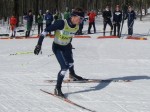
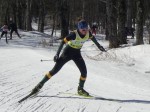
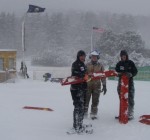
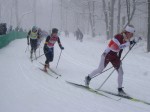


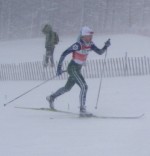
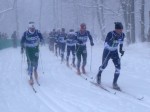





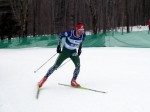
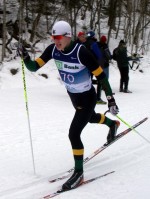
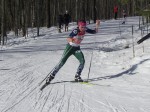



One comment
skievan
February 27, 2012 at 9:49 pm
Great recap Aubrey! Crazy day out there.